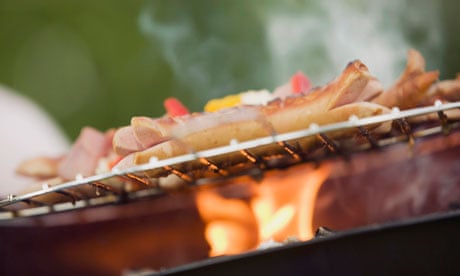The June rain falls, and the thoughts are drawn to the British barbecue as the sparks fly upward. Ponder, if you will, its soggily estival joys. The paper plates, tepid rosé, brown lettuce, bovine protein and blackened wursts: there's something calm and comforting in their plucky drudgery. And often when an British barbie seems to go right, it's wrong. The other day the world witnessed the spectacle of Obameron clapping tongs while their wives served salad. It was an episode, one assumes, designed to endow the premiers with a safe, approachable blokiness, but it just looked weird and embarrassing. Never accept a flipped patty from a man wearing a tie, particularly when he's served it to you from a wok.
Most Britons, I think, simply don't get barbecues. They use them as ordinary cookers transplanted into the garden. Food always tastes better outdoors, of course, so even a crap barbecue can be fun, butch and boozy. But the point about barbecuing is that it's a different kind of cooking altogether.
Here's a barbecue truism. The more skill and practice needed to operate the contraption, the more flavour you'll get from it. To barbecue is to strike a compromise between the taste of the food and the practicality of the machine. An electric grill heats up quickly and its temperature can be reliably controlled, but the food that comes off it tastes no better than something from an ordinary frying pan. Nor is gas anything special. A pork chop off a £2,000 gas grill tastes no better than one from a £50 griddle, and you don't need to ring Calor to fire up one of those.
Any cooker heats food. What matters in barbecuing is that smoke flavours the food, that the complex and often dangerous chemicals released from burning wood and charcoal should imbue your dinner with their fuggy aromatics. A barbecue can be as simple as a bit of chicken wire suspended over some bricks with the fuel glowing beneath it – that's how at least one well-regarded chef I know chooses to do things. There's more technique to it, as you have to add the fuel at the right time, clean it properly, perhaps adjust the height of the food, and so on. But around the world, that's how most meat gets grilled, from the shashliks of Mongolia to the yakitori of Japan.
Though it scarcely needs mentioning that the USA is the home of the modern barbecue, many British people are ignorant of the truly American "Q". The word barbecue comes from the colonial Spanish "barbacoa", itself most likely derived from the Arawak word for the structure on which meat could be dried or roasted. A Mexican barbacoa was traditionally a hole dug in the ground in which a hunk of meat (often a cow's head or a whole goat) would be slow-roasted, covered with the beautiful leaves of the maguey plant. Much of southern Texas was for many years part of Mexico, and this dish survives among certain communities there.
As you know, everything is bigger in America, and US barbecues differ from ours in size more than anything. Their meat swells and mutates from teensy European slices and girly little trimmings into entire prostrate muscly carcasses. Cooking times stretch from 15 minutes for Euro chicken breasts to 18 hours for a whole fat pig. And the smokers, in Simon Majumdar's words, are the size of small European cars. America divides itself with proud southern tribalism into barbecue factions. The intricacies of the four major styles (those of Memphis, the Carolinas, Kansas City, and Texas), the esoteric subtleties of the different condiments and sauces, the relative merits of the smoke from mesquite or pecan wood, are not our concern at the moment. It need only be said that those poor souls who think a barbecue involves a dismal burger, a cold bap and a splat of ketchup are missing out.
In recent years, a few foodie Brits have begun to realise the glories of slow-barbecuing. This dish from the first-class blogger Helen Graves looks superb, but it'll be a while before such cooking becomes mainstream. I bought a Weber kettle this year, and it did a good job for 15 people on Saturday: burgers, jerk chicken, grilled veg with aioli, and we also had some Iberico ham and a salad of my most esteemed and beloved potatoes, Jersey royals. There's a superb recipe in James Ramsden's new book Small Adventures in Cooking for pork shoulder steaks marinated with fennel seeds, chilli and lemon juice which would be a delicious alternative to a banger from Iceland.
A final note on the supposed blokiness of the barbecue. I had always been suspicious of the armchair anthropology that said men are drawn to the barbecue because of some ancient connection to gazelle hunting, or whatever. Like other people (pdf) I had vaguely assumed the phenomenon had more to do with the ways in which the role of fatherhood has changed since the second world war, or that perhaps it was a consequence of or reaction to feminism. (I admit the theory needed work.) And because historically in many societies the women invariably do the cooking, the idea that men should have monopolised the grilling of animal flesh seemed illogical. But Alan Davidson points out that in east Africa (which he takes to include Malawi, Zambia and Zimbabwe as well as the EAC countries), "Women [traditionally] cooked only indoors within their own homes, while the men were responsible for open-air cooking such as grilling and barbecuing." Perhaps, in the Downing Street garden, Potus and our own dear leader were on to something.

Comments (…)
Sign in or create your Guardian account to join the discussion